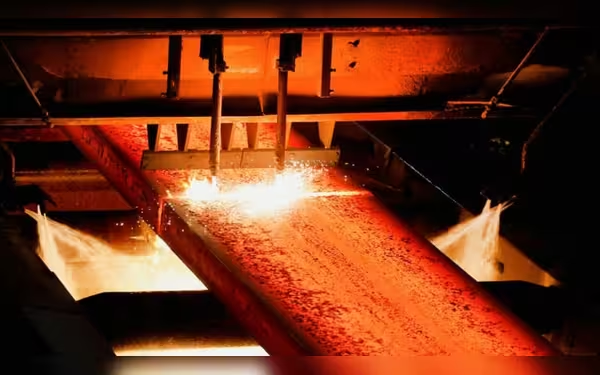Saturday, November 16, 2024 09:48 PM
Tata Steel CEO Warns of Chinese Imports Impacting Indian Steel Investments
- Tata Steel CEO criticizes unfair pricing of Chinese steel imports.
- Prolonged imports may hinder India's steel investment strategies.
- India's steel demand projected to grow by 8-9% in 2024/25.
 Image Credits: channelnewsasia
Image Credits: channelnewsasiaTata Steel's CEO warns that prolonged Chinese steel imports may adversely affect India's investment plans.
In recent times, the Indian steel industry has been facing significant challenges due to the influx of steel imports from China. The chief executive officer of Tata Steel, TV Narendran, has raised concerns regarding the pricing of these imports, labeling them as "unfairly priced." This situation has the potential to adversely affect the investment plans of the domestic steel sector.
Narendran pointed out that the Chinese steel is not necessarily more competitive; rather, Chinese manufacturers are willing to sell steel at prices that result in losses. He emphasized that this practice constitutes "unfair competition," which could have long-term implications for India's steel industry. If the current trend of prolonged Chinese imports continues, it may hinder the investment strategies that Indian steel companies are planning.
India has emerged as a global hotspot for steel demand, driven by rapid economic growth and increased infrastructure spending. The demand for steel in the country reached a seven-year high during the April to August period. Despite being the second-largest crude steel producer in the world, India has remained a net importer of finished steel, with imports from China also reaching a seven-year peak. Narendran noted that some of the steel entering India is also coming from Southeast Asia.
In response to the rising imports, the Indian government has initiated an anti-dumping investigation into certain steel products imported from Vietnam. The industry is advocating for higher import tariffs or safeguard measures to counter the increasing volume of imports. Narendran indicated that, given the current Chinese supplies, prices for flat steel products are likely to remain stable.
Looking ahead, the demand for steel in India is projected to grow by 8 to 9 percent during the 2024/25 period, fueled by sectors such as construction, automotive, railways, and oil and gas. Interestingly, Narendran mentioned that any potential tariff increases from the newly elected US president, Donald Trump, are unlikely to significantly impact India, as the country exports very little steel to the US.
On a separate note, Tata Steel is not pursuing any acquisitions of coking coal assets overseas, as the company’s operations in India are sufficiently supported by supplies from Australia. This strategic decision reflects Tata Steel's focus on maintaining a stable supply chain while navigating the complexities of the global steel market.
The ongoing situation with Chinese steel imports poses a significant challenge for India's steel industry. As the sector grapples with these issues, it is crucial for stakeholders to remain vigilant and proactive in addressing the potential impacts on investment and growth. The future of India's steel industry will depend on how effectively it can adapt to these external pressures while continuing to meet the growing domestic demand.













